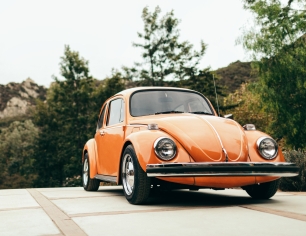Classic cars vs. modern cars: Which should you get?
Choosing between a classic car and a modern car comes down to what you prioritize as an owner. Modern cars offer advantages in safety, engineering, technology, and maintenance requirements. Classic cars, on the other hand, can be valuable investments that appreciate over time if they're rare or desirable. They also hold sentimental value, and some classic car enthusiasts argue that they're easier to repair than modern cars.
Explore Progressive Answers' auto editorial guidelines to find out why you can trust the car insurance information you find here.
What are the differences between modern and classic cars?
There are several differences between modern and classic cars, including:
Safety
Modern cars are significantly safer to drive than classic cars due to advancements in engineering and technology. From seatbelts to airbags, anti-lock brakes, crumple zones, and more, modern cars include safety features that keep drivers and passengers safe in the event of an accident. Classic cars were produced at a time when safety regulations were less demanding and crash testing was limited or nonexistent. Modern car manufacturers now engineer and promote their cars with safety features as a primary selling point.
Cost
It's difficult to compare the cost of modern cars and classic cars because they vary widely depending on the specific make and model. Purchase prices for modern cars are more consistent — the cheapest entry level models start around $18,000, while entry-level luxury models come in at around $45,000. Classic cars typically have a wider range in prices. You can find classic cars on Hagerty Marketplace for as little as $1,000 and as much as $1 million, depending on their condition and desirability.
Maintenance
Classic cars generally require more maintenance than modern cars due to the age of their parts and systems. Classic cars tend to need more frequent tune-ups and oil changes, where modern cars are designed to operate without maintenance for longer periods of time. Classic cars may offer advantages to owners with mechanical knowledge. Their simpler systems may be easier to repair than the digital systems of modern cars, which usually require professional service.
Value
Classic cars may increase in value, offering a stark difference to modern cars, which almost always depreciate after purchase. That's because the market for classic cars fluctuates based on collector demand. Rare or desirable classic cars can appreciate significantly if the car is well-maintained. It's not a guarantee, however, and investing in a classic car comes with the same downside risks of any other investment. Modern cars rarely increase in value but may be easier to sell due to the larger and more traditional resale market.
Environmental impact
If driven daily, modern cars are generally more environmentally friendly than classic cars due to improved technology and stricter emission standards. Depending on the model, many classic cars lack catalytic converters or particulate filters that reduce emissions. Modern cars also include hybrid or electric models that are designed specifically to limit pollutants and increase fuel efficiency. However, if you don't drive a classic car often, the environmental impact may be limited.
What makes modern cars safer versus classic cars?
Modern cars are generally safer than classic cars because technology has advanced and manufacturers and buyers now place greater emphasis on safety. Seat belts were introduced in the 1960s, and other features such as anti-lock brakes and airbags have become standard in the decades since.
Modern cars now feature crash avoidance technology and driver alerts that aren't found in classic cars. The advanced engineering of modern cars also makes them safer than classic cars — newer models tend to absorb bumps, minimize noises, and offer adjustable driving positions, including stability control and traction control, that enhance awareness and safety.
Can a classic car be made safer?
While seat belts can usually be added, other effective modern safety components like crumple zone improvements and airbags generally can't be added to a classic car. But there are upgrades and measures classic car drivers can take to help lower their risks on the road. These steps include:
- Performing regular maintenance on the vehicle
- Making sure you have modern, high-quality tires and brakes
- Limiting your drive time
- Installing a backup camera
- Upgrading to an electric power steering unit
- Taking an advanced driver safety course
Learn more ways to modernize a classic car.
Are older cars more reliable than new cars?
Although newer vehicles are generally safer than classic cars, there's an ongoing debate over reliability. Classic car proponents argue that older cars were designed to last a long time with parts that can be fixed or replaced easily and inexpensively. New cars, they argue, are filled with electronics that require special expertise and diagnostic equipment when they malfunction.
Those who argue for modern cars point out that technologies like onboard diagnostics have made it easier to identify issues and repair vehicles. Their argument is also bolstered by a 2021 J.D. Power vehicle dependability study that found that cars and trucks have grown more reliable over the past decade. The same study in 2025, however, reveals that vehicle problems after three years of ownership have reached the highest level since 2009.
How does choosing a classic car vs modern car impact insurance?
If you choose a classic car, it may qualify for classic car insurance. This specialized insurance tends to provide more coverage for lower prices than standard auto insurance. However, if you drive your classic car daily, you will have to buy a standard auto insurance policy.

Get a free quote for classic car insurance today
Learn more about classic car insurance policies.









